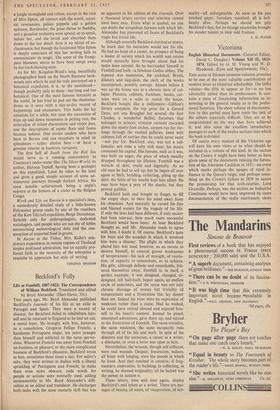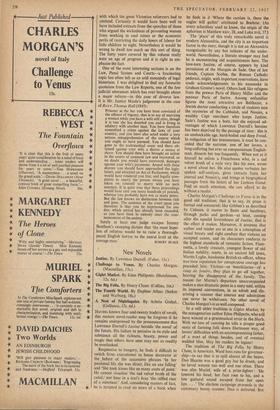Vtctonana
English Historical Documents. (General Editor, David C. Douglas.) Volume XII (I), 1833- 1874. Edited by G. M. Young and W. D.
Handcock. (Eyre and Spottiswoode, 95s.), THIS series of thirteen immense volumes promises to be one of the most valuable contributions of modern times to historical scholarship. The latest volume—the fifth to appear so far—is no less admirably edited than its predecessors. It con- tains a mass of fascinating information as in- teresting to the general reader as to the profes- sional historian. The sheer volume of documenta- tion in this period must have made the task of the editors especially difficult. They are to be congratulated on the way they have achieved it, and also upon the excellent introductory passages to each of the twelve sections into which the book is divided.
Of course every student of the Victorian age will have his own views as to what should be included in a volume of this kind. In the section on the Crown it might have been better to have given some of the documents relating the forma- tion of the Aberdeen Coalition in 1852—an event which marks perhaps the apogee of royal in- fluence in the Queen's reign; and perhaps some- thing on the Crown's failure in 1859 to secure the premiership for that arch-courtier, Lord Granville. Perhaps, too, the section on Industrial Conditions would have been improved by more documentation of the really reactionary views with which the great Victorian reformers had to contend. Certainly it would have been well to have included extracts from the speeches of those who argued the wickedness of preventing women from working in coal mines or the economic perils of restricting the daily hours of labour for little children to eight. Nevertheless it would be wrong to dwell too much on this sort of thing. The forty years covered by this volume really were an age of progress and it is right to em- phasise the fact.
One of the most interesting sections is on the Law, Penal System and Courts—a fascinating topic too often left as an arid monopoly of legal historians. I was delighted to find my favourite quotation from the Law Reports, one of the few judicial utterances which has ever brought about a major reform—in this ,case of divorce law. It is Mr. Justice Maule's judgement in the case of Rex v. Thomas Hall (1845):
Prisoner at the bar you have been convicted of the offence of bigamy, that is to say of marrying a woman while you have a wife still alive, though it is true she has deserted you and is living in adultery with another man. You have therefore committed a crime against the laws of your country, and you have also acted under a very serious misapprehension of the course which you ought to have pursued.. You should have gone to the ecclesiastical court and there ob- tained against your wife a decree a mensa et thoro. You should then have brought an action in the courts of common law and recovered, as no doubt you would have recovered, damages against your wife's paramour. Armed with these decrees you should have approached the legis- lature, and obtained an Act of Parliament, which would have rendered you free, and legally com- petent to marry the person whom you have taken on yourself to marry with no such sanction. It is quite true that these proceedings would have cost you many hundreds of pounds, whereas you probably have not as many pence. But the law knows no distinction between rich and poor. The sentence of the court upon you therefore is that you be imprisoned for one day, which period has already been exceeded, as you have been in custody since the com- mencement of the assizes.
Surely at least one judge escapes Jeremy Bentham's sweeping dictum that 'the most hope- less of reforms would be to raise a thorough- paced English lawyer, to the moral level of the











































 Previous page
Previous page